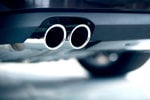Review
For example, when the windscreen washers are activated, the ventilation system automatically switches to recirculate for a few seconds to prevent the odour of the screen wash solution intruding into the cabin.
Likewise, the air recirculation function operates when reverse is selected to avoid the system taking in the exhaust fumes of the car. And computers can detect when the camber of the road is causing the car to veer to the left, and apply corrective steering.
Reassuring details like these give you confidence that the bigger picture must be pretty good if the little things have been afforded such scrutiny.
Volkswagen claims the latest Golf is the biggest change for the car since the transition from the original to the second-generation car 21 years ago.
It is Volkswagen's best-selling car, reaching more than 22 million sales across the first four generations of the car.
The new Golf is two inches longer than the model it replaces, an inch wider, nearly two inches taller and nearly three inches longer in the wheelbase.
There is a new diesel engine, as well as a revised version of the existing 1.9 TDI, while most of the petrol engines offered will have fuel-saving FSI technology. All engines, including diesels, will be euro IV compliant, avoiding the 3% supplement on benefit-in-kind tax.
Volkswagen's head of fleet, Vincent Kinner, said the firm had become recognised for its TDI engines and is now attempting to repeat its success with direct injection petrol engines.
He said: 'We have distinguished Volkswagen as the leading brand for diesel. The technology is more widely understood and TDI is doing the same job for us that the GTi badge has done. With this car we will be launching FSI, the petrol equivalent of pumpe duse. It's our intention to establish that as firmly as we have with the diesel engines.
'It's a longer-term sell as well, because until the right fuels (sulphur-free) are available drivers won't get the full advantage of FSI. As time goes by, we'll start to see the real benefits of FSI come through.'
One of the criticisms levelled at the last Golf was that it was less rewarding and less involving to drive than some of its rivals so suspension, steering and damping have been completely revised for the new car.
The Golf now features an electronic stabilisation programme (ESP) across the range as well as ABS brakes with emergency braking assistance. Other standard safety features include front, side and curtain airbags and active front head restraints that react in an accident to reduce whiplash injuries.
Engine options available at launch include an eight-valve conventional 1.4-litre petrol engine, a 1.4-litre FSI and a 1.6-litre FSI. Diesel engines include a 1.9 TDI and a 2.0 TDI.
In March, a 2.0-litre FSI petrol engine will be launched, along with a normally-aspirated 2.0 SDI diesel. The Golf GTI, using a 200bhp turbocharged 2.0-litre FSI engine, will be launched at the end of the year before a new high performance R32 is launched in 2005.
Automatic transmission options will include a six-speed Tiptronic gearbox as well as a DSG (direct shift gearbox) system offering the smoothness of a conventional automatic with the responsiveness of a manual. The mark four Golf estate will continue into 2005 alongside the Bora saloon.
Behind the wheel
THE new Golf is still immediately recognisable as Volkswagen's best seller, even if the large headlamps and detailed rear light clusters are rather more avant garde than we are used to.
While the body is all new, more significant changes have taken place under the skin. The interior is impeccably finished, as you might expect, and many features are shared with the new Touran. The centre console is a lesson in function and clarity, while the large dials have the trademark soothing blue backlit appearance. The top of the dashboard is slush-moulded and is soft to the touch, while the hard plastics on the lower section of the dashboard look identical, but are more robust.
The interior is roomy and comfortable, although a little sombre when fitted with black trim.
Both turbodiesel variants (all new Golf diesels will now be Euro IV compliant) were available for testing at the UK launch, and the 1.9-litre is essentially carried over from the last Golf.
The new Golf was noticeably quieter than the previous incarnation, despite using the same engine. Volkswagen says changes to the engine mounting points and a stiffer body shell help reduce vibration from the engine and it seems to have worked.
Performance is more than adequate with 184lb-ft of torque from 1,900rpm, and you feel far more connected to the driving experience than in the previous model.
All Volkswagen pumpe duse diesels offer an excellent combination of performance and fuel economy but compared to some common rail diesels have traditionally been noisier because of higher injection pressures. In the new Golf, the diesel engines sound subdued at all times. The 2.0-litre TDI engine, boasting 140bhp and a six-speed manual transmission, is even more capable, with 236lb-ft from 1,750rpm yet still achieving nearly 50mpg on the combined cycle.
Ride comfort is excellent, while the new car feels far more agile than the last couple of iterations. The electro-mechanical power steering offers variable assistance and while it might not offer all the feedback of an electro-hydraulic system, it is certainly more communicative than most Volkswagen drivers would be used to.
Body roll is limited and the improved noise insulation means the diesel Golf will be an even quieter motorway companion than before.
Driving verdict
THE latest Golf is surprisingly good to drive and the diesel models build on Volkswagen's reputation of offering strong performance with low running costs. A class benchmark once again.
| Fact file | ||||||||||||
|---|---|---|---|---|---|---|---|---|---|---|---|---|
| Model: | 1.4 | 1.4 FSI | 1.6 FSI | 1.9 TDI | 2.0 TDI | |||||||
| Engine (cc): | 1,390 | 1,390 | 1,598 | 1,896 | 1,968 | |||||||
| Max power (bhp/rpm): | 75/5,000 | 90/5,200 | 115/6,000 | 105/4,000 | 140/4,000 | |||||||
| Max torque (lb-ft/rpm): | 93/3,800 | 96/3,750 | 114/4,000 | 184/1,900 | 236/1,750 | |||||||
| Max speed (mph): | 102 | 108 | 119 | 116 | 126 | |||||||
| 0-62mph (secs): | 14.7 | 12.9 | 10.8 | 11.3 | 9.3 | |||||||
| Fuel consumption (mpg) | 40.4 | 43.5 | 41.5 | 53.3 | 49.6 | |||||||
| CO2 emissions (g/km): | 168 | 156 | 163 | 143 | 154 | |||||||
| Fuel tank capacity (l/gal): | 55/12.1 | |||||||||||
| Transmission: | 5-sp man, | 6-sp man | Service interval (miles): | Variable | On sale: | January 30 | Prices (OTR): | £11,995-£18,530 | ||||















